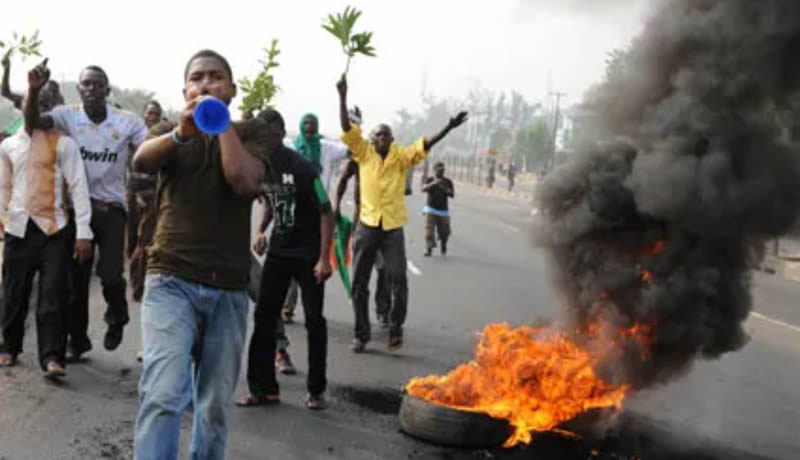
For 23 years, Nigeria has practiced democracy, electing candidates into different positions through the secret ballot system. This process, since the return of democracy in 1999, has provided Nigeria with 4 presidents. However, Nigeria’s democracy over the years has recorded a series of violence and senseless attacks on state and non-state actors. The 23 years of Nigeria’s democracy have encountered a series of repeated challenges.
Violence In The Past, Violence Now
There was widespread violence following allegations of fraud regarding the 1999 election that ushered in the presidency of Olusegun Obasanjo. It is estimated that about 80 people died. Similarly, at least 100 people were killed during incidents of violence triggered by federal and state elections in 2003, and over 300 people lost their lives in connection to electoral violence four years later, with pre-election violence alone claiming more than 70 lives.
Again, in 2011, post-election violence led to the death of at least 800 people over three days of rioting in 12 states across northern Nigeria — the worst case so far in the country’s political history.
“The violence began with widespread protests by supporters of the main opposition candidate, Muhammadu Buhari, a northern Muslim from the Congress for Progressive Change, following the re-election of incumbent Goodluck Jonathan, a Christian from the Niger Delta in the south, who was the candidate for the ruling People’s Democratic Party,” noted Human Rights Watch.
During and after the general elections in 2015, more than 100 people lost their lives, according to the International Crisis Group. And finally, the European Union Election Observation Mission said about 150 people were killed due to violence linked to the last national elections of 2019.
In the just recent presidential election held on the 25th of February, there were pockets of violence recorded in different parts of the country, including Lagos state, the country’s economical hub.
Violence was recorded in Lagos, areas such as Mafoluku, Amuwo Odofin, Oshodi, Surulere, Ijaiye, Ijaniki, LASU Iba, Iyana Shashi, Ikorodu, Fadeyi, Ojota, Ogombo, Badagry, Sangotedo, and Lekki. At Ijaiye, polling units were affected Branco (two), Agboola (one), and Obisanya (one). The polling units affected in Surulere include Adedeji, Owoseni, Dipo Olubi, Itire, and Aguda.
Available information revealed that voting was disrupted in polling units around Surulere, Ikate, and Ajah after thugs attacked the area and warned the voters who were not willing to vote for the presidential candidate of the All Progressives Congress (APC), Bola Tinubu to vacate the polling units while policemen looked away.
In Ikate, thugs scattered ballot boxes and dumped them in the gutter. At Ogombo Primary School, in the Lekki area of the state, thugs chased away voters and locked the gates while police officers stood still, smiling at them. The situation was not different at Ojota Senior Secondary School.
In Kogi State, a young man identified as Akayama was gunned down at Anyigba, in Dekina Local Government Area of the state, by thugs who invaded the town to cart away electoral materials. The thugs took over the town, shooting sporadically and carting away electoral materials from different polling.
In Akwa Ibom State, hoodlums suspected to be political party supporters inflicted machete cuts on two voters before carting away with one Bimodal Voter Accreditation System (BVAS) for polling units 11 and 12 at Oniong West Ward one in Onna Local Government Area of the state.
State Actors Abuse Power
The just concluded February 25th election saw Journalists arrested and harassed by security operatives. Adesola Ikulajolu, a Nigerian journalist and fact-checker, reported that Department of State Security (DSS) officers “collected my phones and deleted some of the pictures [I had] already taken. They were ready to bundle me into their van if I didn’t cooperate with them. [Eventually] they gave me back my phone and told me to leave the premises immediately.” Ikulajolu was approached by the officers while taking photos of voters at a polling unit for a report on the upcoming gubernatorial elections.
Also, Haruna Muhammad, publisher of WikkiTimes was being held at the Criminal Investigation Department (CID), Bauchi Police Headquarters allegedly on orders of the state governor, Bala Mohammed. Haruna was said to have been arrested earlier on Saturday( February 25th) at Duguri, the governor’s hometown in the local council, where he was covering the election.
According to a statement by Wikki Times before the arrest, Haruna was interviewing some women who were protesting that they submitted CVs but were not employed. During the course of the interview, the women started protesting that they would not vote.
Soon, some hoodlums alleged to be supporters of the governor attempted to lynch him before the police whisked him away. The police had earlier explained that he was taken away for his own safety but refused to release him until the governor gave an order.
Haruna was thereafter remanded in prison by a magistrate court sitting in Bauchi State after spending over 72 hours in detention illegally.
Arrest Of Journalists Threatens Democracy
Abadat Bakrin, a legal practitioner said that arresting Journalists in the course of their duties can affect the active participation of the people, as citizens in politics where there are no media to inform the people of what is going on, while also noting that It can affect the civic life Protection of the human rights of the citizen(s).
“The Constitution of the Federal Republic of Nigeria 1999 (as amended) Chapter IV provides for the Fundamental Rights of its citizens. Freedom of Press/Speech is included as one of the fundamental rights of the citizens of the Federal Republic of Nigeria.
“Arresting Journalists in the course of their duty is unlawful, it amounts to a breach and an infringement of their fundamental human rights,” she said.
Emphasizing how democracy can improve in Nigeria, she noted that Each person has freedom of speech, association, movement, and freedom of belief, and the government should Protect the rights of the citizens, fight corruption, and Respect citizens’ right to make their own choices.